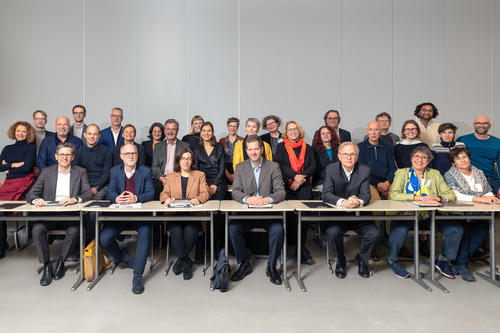About us
Contestations of the liberal script have not only grown in number, they are becoming increasingly polarized and radicalized, both at the domestic and at the international level. This deepening of contestations carries the danger of turning criticism of the liberal script into outright rejection of its core principles. The Excellence Cluster "Contestations of the Liberal Script (SCRIPTS)" is an interdisciplinary research consortium that examines the nature, causes, and potential consequences of deepening contestations in a global, comparative, and historical perspective.
SCRIPTS developed the concept "liberal script" to understand how and why liberal ideas and institutions for organizing societies have become increasingly under pressure, despite their political, economic, and social achievements and in the absence of an attractive alternative. In the next step, the Cluster will investigate how resilient the liberal script is in coping with deepening contestations. We want to find out why some varieties appear to be more effective in handling criticism and rejection than others.
SCRIPTS is a Cluster of Excellence funded by the German Research foundation since 2019. It is hosted by Freie Universität Berlin and involves seven other major research institutions in Berlin as well as 20 international partners. The Cluster also cooperates with institutions and actors in politics, culture and civil society.
Selected SCRIPTS Working Papers
Video | The SCRIPTS research programme: Contestations of the Liberal Script
The world has experienced a series of political shocks in the last two decades despite huge economic and social achievements that range from a decreasing number of interstate wars to a delcine of absolute poverty in many parts of the world. Through its research programme, SCRIPTS has set out to investigate the puzzle of an increasing number and and frequency of contestations of the liberal script.
English subtitles available soon
YouTube
SCRIPTS unites eight major Berlin-based research institutions that share responsibilities in managing projects and resources. It is hosted by the Freie Universität Berlin and cooperates with the Humboldt-Universität zu Berlin (HU Berlin), the WZB Berlin Social Science Center, the Hertie School, the German Institute for Economic Research (DIW), the Berlin branch of the German Institute of Global and Area Studies (GIGA), the Centre for East European and International Studies (ZOiS), and the Leibniz-Zentrum Moderner Orient (ZMO).
SCRIPTS’ Partner NetworkScientists from 17 disciplines and numerous countries analyse contestations, contradictions, and developments of the liberal script worldwide. Cluster research teams are made up of doctoral researchers, post-doctoral researchers, and professors from social and area studies. Research projects are linked to at least one thematic “Research Unit”, of which there are four (“Borders”, “Orders”, “Re-Allocation” and “Temporality”). The two Junior Research Groups (JRG) and SCRIPTS’ cross-cutting units (the “Theory Network” (TN), the “Data and Methodology Center” (DMC) and the “Knowledge Exchange Lab” (KEL)) contribute to the research.
Find out more about SCRIPTS’ Research ProjectsAs an interdisciplinary research consortium, SCRIPTS connects academic expertise in the social sciences and area studies and collaborates with twenty-one research institutions in all world regions.
To foster international academic cooperation and to provide early career development, the Berlin International College of Research and Graduate Training (BIRT) has been established for SCRIPTS. It hosts the SCRIPTS doctoral programme and brings renowned visiting scholars to Berlin.
Webpage of the the Berlin International College of Research and Graduate Training (BIRT)Beyond that, SCRIPTS is well connected with research institutes and knowledge exchange partners, including the Humboldt Lab at the Humboldt Forum Berlin and the German Federal Foreign Office, with whom the Knowledge Exchange Lab has partnered with on several projects. Such collaborative enterprises are aimed at fostering a mutual exchange of knowledge.
Webpage of the SCRIPTS’ Knowledge Exchange Lab (KEL)Following an inclusive and emancipatory vision of collaborative knowledge production, SCRIPTS aims at promoting diversity. We envision that people with individual experiences, talents, points of view and ways of thinking will decisively enrich the Clusters’ research and management units and will contribute to a multifaceted, interdisciplinary research output.
Webpage SCRIPTS DiversitySCRIPTS is one of seven clusters of excellence currently based in Berlin that are being funded by the Deutsche Forschungsgemeinschaft (DFG, German Research Foundation) over a period of seven years. The clusters of excellence are part of the Excellence Strategy, a program of the federal and state governments to promote outstanding research networks that serves to promote top-level university research in Germany.
To the overview page of the Deutsche Forschungsgemeinschaft (DFG)
